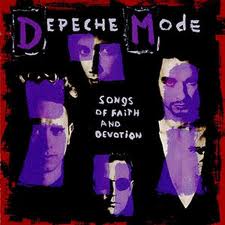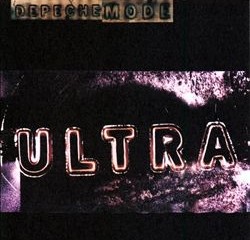
Described as a ‘quintessential electro-pop band’ in the ’80s and one of the most successful bands of the ‘alternative’ ’90s, Depeche Mode entered the first half of the 21st century as a band that had already amassed worldwide fame. By 2000, they already had 10 albums to their name, commercial and critical success, and squillions of dollars. They also carved their niche in a genre that can only count on one hand the number of successful career artists. They are imitated across several genres with artists as diverse as Rammstein, Monster Magnet, Smashing Pumpkins and the Deftones all paying homage or respect as evidenced on the 1998 tribute album For the Masses. One has no farther to look at the careers of The Bravery, Linkin Park, Interpol, Placebo and any number of EDM artists today to see how wide their shadow across the plains of contemporary rock reaches.
Here’s part one of our look at the band’s discography, in which we captured their ascent. We’ll start the second and final installment off with the album that made Depeche Mode a household name.
Violator (1990)
Angsty 14 year old? Meet your new obsession. Sure, I knew about Depeche Mode prior to Violator‘s release. “People Are People” was a radio hit, and songs like “Strangelove” were regional hits in synthesizer-obsessed New York City. The combination of my transition to a multi-cultural high school with a strong Asian population (is it racist to say that NYC’s Asian population fucking adores Depeche Mode?) and DM’s ascension to multi-platinum stadium fillers couldn’t have come at a better time. Because of that confluence of events, Violator is one of the essential and most memorable albums of my teenage years. It’s almost perfect (I guess I could do without “Clean.”) “Personal Jesus” remains one of the defining songs of the decade-never mind that it was actually released at the tail end of the previous one, and “Enjoy the Silence” and “Policy of Truth” are as great as synth-pop gets. “World in My Eyes” finds Dave Gahan working the seductive Elvis angle (and succeeding) for the first time, and “Waiting for the Night” is an ambient masterpiece. “Sweetest Perfection” indeed.
Grade: A (Big Money)
 Songs of Faith and Devotion (1993)
Songs of Faith and Devotion (1993)
The inevitable disappointing followup to the bazillion-selling Violator was only actually disappointing to those expecting Violator, Part II. Those willing to open their mind (and look past the ugly, loud, “Personal Jesus”-aping opener and first single “I Feel You”) will find one of the only examples of a marriage between synthpop and gospel music ever working.
The gospel influence is most obvious in “Condemnation” and “Get Right With Me”, the former of which offers up a gospel choir made up of multi-tracked Martin Gore voices, and the latter of which gives us an actual choir. Both feature impassioned performances from David Gahan, perhaps trying to find the light in the midst of the chemical haze that nearly killed him. It is this passion and performance from Gahan, actually, that most separates Songs of Faith and Devotion from its predecessor; where Violator offered perhaps the best of Gahan’s ’80s style of detached, almost deadpan vocals, Songs makes the storyteller the subject of his own stories. His pain is palpable, making Songs a difficult listen for those accustomed to his previous style.
Amidst all the pain are some of the catchiest melodies Martin Gore ever wrote. “Walking in My Shoes” is ingratiating enough to get stuck in your head for days, while “Judas” is his sweetest vocal turn since “A Question of Lust.” The band may have been falling apart a bit at this point, but the album they released in the midst of the chaos is one of the most interesting and beautiful things they ever did.
Grade: A- (Mike S)
I was blindsided by Ultra. I owned it for three months — three months! — before I even put it into my CD player. I didn’t buy it because I wanted it, I bought it because Columbia House sent it to me, the end result of one of those “eight CDs for a penny!” deals that were so prevalent in the mid-’90s. Actually listening to it was a matter of being lonely and bored in a dorm room in the fall of ’97, with nothing better to do than to listen to the shrinkwrapped CD in my desk.
An hour or so later, I’d found a new obsession.
Ultra is the best kind of slow burn, the kind that gives you new reasons to fall in love with every listen. The first time through, maybe you think Martin Gore’s vocal melody in “Home” is utterly predictable and yet utterly perfect. The second time, maybe you find yourself trying to imitate David Gahan’s octave drop in the verse of “Useless”. The fourth time, you notice that “The Bottom Line” and “Insight” are a perfectly-sequenced one-two punch about following someone blindly but faithfully into the fire. The seventh time, you never want the bassline of “Freestate” to end, and it almost doesn’t. The tenth time, even the wildly chaotic “Barrel of a Gun” starts to make sense.
Ultra is a quiet album, an insular album, but an expressive one nonetheless. It feels like the beginning for a new Depeche Mode, for reasons greater than the departure of Alan Wilder. It is the sound of a band humbled, yet ready to carry on.
Grade: A (Mike S)
 Exciter (2001)
Exciter (2001)
Most of the problem with Exciter is that it sounds like a band trying to live up to what they’re supposed to be. Depeche Mode lives in the darkness, so we get the clunky, ham-handed “Dead of Night”. Depeche Mode loves religious metaphor, so we get Martin Gore’s trying-too-hard verses in “Breathe”. Depeche Mode sometimes writes songs in 6/8 with the word “sweetest” in the title, so we get “Sweetest Condition”.
There are moments throughout Exciter, moments where Depeche Mode stops trying to live up to their own identity and just crafts a brilliant melody, or a brilliant beat, or even a brilliant sound out of an everyday instrument, but those moments are so few and far between as to make most of the album sound like one long wait. First single and opener “Dream On” was a brilliant sign, an impatient, skittery thing that used guitars far more subtly than, say, “Personal Jesus” or “I Feel You” ever could have hoped to, and closer “Goodnight Lovers” is a beautiful, peaceful track that offers one of the gentlest vocal performances David Gahan has ever given.
Aside from those bookends, though, there’s little that’s memorable about Exciter; it’s almost as if the trio was too healthy. There is little inspiration here, and music for music’s sake just doesn’t fly with this band. It takes truth to find beauty in all the darkness, and for the first time in a long time, Depeche Mode was simply playing the part.
Grade: C (Mike S)
Playing the Angel (2005)
The siren like guitar blast that introduces ‘A Pain That I’m Used To,’ is a shot across the bow. It feels like smelling salts have been broken under the nose of a near comatose Depeche Mode fan after 2001’s snoozefest, Exciter. ‘John the Revelator,’ carries on with the kind of fervor and punch their sound had been missing. ‘The Sinner Inside,’ is numbing and provides some of the most aggressive guitar Gore has ever exhibited. ‘Precious,’ is a tuned penned for his children in the wake of Gore’s divorce and is heart-achingly beautiful in contrast. Other album highlights include the brooding ‘Nothing’s Impossible,’ and another upbeat backward-looking track in ‘Lillian.’
Grade: B (KBOX)
 Sounds of the Universe (2009)
Sounds of the Universe (2009)
Has anyone else noticed how good a singer David Gahan has become in what I suppose are Depeche Mode’s twilight years? The improved emotional range of an already legendary frontman was what I took away the most from the first Depeche Mode I’d given a shit about in a solid decade. Sounds of the Universe is a frighteningly good return to form (or maybe I just need to give Exciter and Playing the Angel another listen?) “In Chains” finds the band at their seductive best. “Wrong” brings out the animal in the band, proof that synthesizer-based music can have true grit. In an alternative universe, “In Sympathy” would’ve been a huge pop radio hit. Hell, there’s not a lot of difference between DM’s signature sound and the electro-flavored Lady GaGa/Ke$ha sound that was filling the airwaves three or four years ago. Why wasn’t Sounds of the Universe a bigger hit? Well, we’re talking about a twenty-five year old act here—top 40 radio generally isn’t kind to these acts. That’s a shame, though-because this was the best album Depeche Mode put out in at least a decade and a half.
Grade: B (Big Money)
Delta Machine (2013): The band’s continued success at picking the meat off the bones of love is better than any crow I know. On their 13th album, they revisit a portion of their 90’s heyday by looking backwards at Songs of Faith and Devotion as a point of reference. The Mode have always walked a fine line between guitar and synth-pop. On Delta Machine that line is walked with excellent – not mixed – results. This album is also quite warm sounding. They’ve taken what has generally been considered a rather cold medium and translated it with some deft songwriting and that golden, chameleon-like voice of Gahan’s. Album highlights include the gritty sermon in ‘Angel’; the electro-gospel of ‘Heaven’; and the night drive film noir of ‘Soothe My Soul.’
Grade: A- (KBOX)


